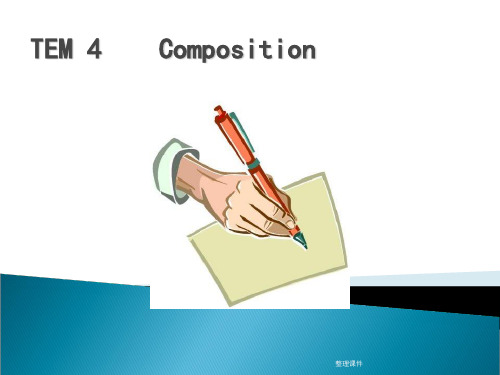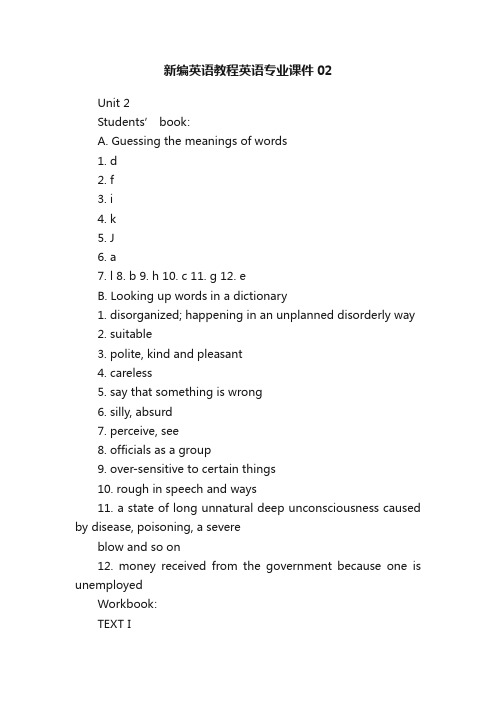专业英语课件
《专业英语》课件(7)-Steady_State

(5)It must be admitted that… 必须承认,……
(6)It appears (seems) that… 看来……,似乎…… (7)It is stated (said, reported, estimated, calculated, suggested, guessed, supposed) that…据说(报道,统 计,推算,建议,猜测,推测)……,一般认
steady-state error final value theorem distinguish type number integer integrator ramp n. n. n. v. 稳态误差 终值定理 区分,辨别 型数 整数 积分环节,积分器 斜坡
acceleration
n.
加速度
扰动误差
disturbance error
superposition
identical
n.
a.
叠加
相同的,一样的
eliminate
ahead of
v.
消除
在前面
entry
accompany
n.
v.
入口
伴随
难句解释:
[1] The designer should be fully aware, however, of the
的稳态误差可写作下式:
esቤተ መጻሕፍቲ ባይዱ lime(t ) limsEr (s)
t s0
(2-2B-1)
对开环传递函数G(s),设有如下的通用式子: K a k s k a1 s 1 G( s) n (2-2B-4) s bl s l b1 s 1 在这个式子中: 1) K 已知,使分子分母多项式的常数项单位化,即传递函 数G的增益。它和下一节介绍的根轨迹增益不同,后者的最高 次幂项的系数是单位值1。 2) G的型数是整数n。分母中s因子代表着积分,型数就是G 中积分环节的数目n。 3) 增益,根据n的不同取值,通常的惯例,把下列名字和 注解与K相联系。 n = 0: Kp = position error constant 位置误差常数 n = 1: Kv = velocity error constant 速度误差常数 n = 2: Ka = acceleration error constant 加速度误差常数
机电专业英语PPT课件

例句:They made an immense improvement in English.
在E英nd语方面他们取得了巨大的进步To。pic Above Next
centrifugal [sen‘trifjugəl] adj.离心的
mass-produced大(批)量生产的
Section II Text
Processes of mechanization have been developing and becoming more complex ev er since the beginning of the Industrial Revo lution at the end of the 18th century.(自从 18世纪末工业革命开始,工业机械化进 程一直在不断地发展,并且变得越来越 复杂。) The current developments of auto matic processes are, however, different from the old ones.(但目前的工业自动化过程 较以前的工业自动化过程有很大的不同)
)
Now people often talk about “feedback” as b
eing an essential factor of the new industrial t
echniques, upon which is based an automatic
self-regulating system and by virtue of which
And in many, though not all, instances th e element of control is so great that me chanization displaces muscle, “automat ion” displaces brain as well.(尽管不 是所有的情况,但在大多数情况下, 控制元件依然发挥着强大的力量, 机械化已经代替了手工劳动,而自 动化代替了脑力劳动。
大学英语专业英语写作课件

整理课件
Sample 1
The Good Habit Nowadays, more and more young people think that it is better that using
整理课件
Instructions
Write a composition of about 200 words. You are to write in three parts. In the first part, state specifically what your opinion is. In the second part, support your opinion with appropriate
details. In the last part, bring what you have written to a natural
conclusion or a summary. You should supply an appropriate title for your composition. Marks will be awarded for content, organization, grammar and
整理课件
5-6分。结构基本符合,但语言过于简单,语法错误多,内 容模糊不清,题目不正确,字数少于170。
举例不可信。举例应该真实可信,比如亲身经 历、朋友体验或者名人轶事等。 文章结尾太简单。
整理课件
Sample 3:Saving Money is a Good Habit
新编英语教程英语专业课件02

新编英语教程英语专业课件02Unit 2Students’ book:A. Guessing the meanings of words1. d2. f3. i4. k5. J6. a7. l 8. b 9. h 10. c 11. g 12. eB. Looking up words in a dictionary1. disorganized; happening in an unplanned disorderly way2. suitable3. polite, kind and pleasant4. careless5. say that something is wrong6. silly, absurd7. perceive, see8. officials as a group9. over-sensitive to certain things10. rough in speech and ways11. a state of long unnatural deep unconsciousness caused by disease, poisoning, a severeblow and so on12. money received from the government because one is unemployedWorkbook:TEXT IComprehension (reference versions):B. Reference version:1. The richer life experience we have, and the more people from all walks of life we know,we will develop more extensive and flexible knowledge of different English styles and the ability to use each style appropriately when the occasion arises.2. If we do not know when to use each style appropriately, or if we confuse one style withanother inappropriately, an unsystematic and casual knowledge of styles is of no use, or even worse.3. Neither "bags of fun" nor "extremely gracious" in its suitable context is a careless / casualexpression of one's ideas.4. It would, however, also be absurd/foolish to turn the judgment completely the other wayround.5. Except in cases where they are used to achieve humorous effect, contemporary writersthink that euphemisms are too disgusting, artificial and pretentious.6. Supporting the argument made by using the outdated and stereotyped phrases that arcoften used by trade union leaders would be as easy as shooting birds that never fly away.7. Some euphemisms are unusual enough to be funny. They are so unusual that they becomequite funny.8. Some people may also like extreme understatement.TEXT IIComprehension1. C2. C3. A4. B5. B6. CTEXT IIIComprehension1. F (The euphemistic term for "dustmen" in the U.S. simply sounds more prosperous. )2. T3. F (He is put in prison, but the name for prison is "adjustment centre". )4. F (There are, but the term "poor people" has been replaced by the euphemism: the "underprivileged". )5. F (There are more euphemisms in English than in many other languages. )GUIDED WRITINGSentence CombinationReference version:Proverbs, probably as old as our civilization, form an important part of our heritage. Children can learn basic lessons from them. For example, they may learn thrift by hearing a parent or grandparent say, "Waste not, want not." Young people tempted to be dishonest are often able to resist the temptation by recalling "Honesty is the best policy". Or persons faced with difficult tasks will be encouraged to persevere by keeping in mind that "Little strokes fell great oaks". And many tense situations are improved when one person or another remembers that "A softanswer turns away wrath", or that "Two cannot quarrel if one won’t".Proverbs are found in almost every language in the world, whether the language is written or not. In fact, where the language has not been written, proverbs are one of the principal ways the people pass down their philosophy of life from one generation to another, thus preserving their most precious heritage.IV. TranslationA. 1. An unknown disease affected his brain so badly that he lost his memory completely.2. The protesting crowds outside the courthouse had no effect at all on the judges and thejury of this Pacific island country.3. A guilty man apprehends danger in every sound.4. Her soft voice and gracious smile put everyone in the room at ease.5. Not until you have a good command of a scale of styles can you speak Englishappropriately in different situations.6. His haphazard knowledge of modern economics was one of the reasons why he failed inhis business.7. The new general manager did not feel very comfortable with the way he was addressedby his colleagues in the company.8. No matter how hard he had tried, his efforts to improve his image in the mind of thepublic proved to be ineffective.9. It was the last thing that occurred to the commander thathis soldiers would defy/disobey his orders.10. Although the composition teacher considers these expressions nothing but clich6s, theyappeal very much to the students.B. Reference version:We should always bear in mind that in different circumstances we use the English language in different ways. This fact, however, is often forgotten. When we think about language, we too often think only of the more formal forms, especially the written forms. But we are not always reading and writing. We use slang, or at least colloquial forms, with friends and acquaintances. In certain social situations, we use clich6s that we would probably blush to write down. We use polite speech when we speak to our elders or our superiors. We use high-sounding language on important occasions. We tell jokes and make comments about things or people near or far. We talk about ordinary things or of the secrets of the universe. We express feelings to one person or to a group. We choose slightly different forms of language for each of these purposes. For a native speaker of English, his choice is partly instinctive and partly based on an awareness of the kind of language that is expected of him. A good command of English must include an acquaintance with all these "registers".V. Blank FillingA. 1. a) died b)death c)dead d)deathly/deadlye)deadly f)deathlike/deathly g)dying2. a) judge b) judgment c)judges3. a)approaching b)approach c)approached4. a)argue b)argumentative c)argument5. a)observing b)observant c)observationsB. 1) countries 2) translation 3) communicate 4) Translators5) misunderstandings 6) universal 7) centuries/ages 8) language9) problem 10) realized 11) language 12) told 13) worked14) more/successive 15) in 16) on 17) Esperanto 18) same/fixed 19) countries 20) newspapers 21) books 22) created/developed 23) has 24) Esperanto25) universal/internationalC. 1.D 2. B 3. C 4. C 5. D 6. B 7. A8. B 9. A 10. D 11. B 12. D 13. A 14. C 15. DD.1. (1) described as (2) just as plainly(3) equals (4) get(5) as was often the case (6) approached a state of collapse and coma(7) done away with2. (1) described ... as (2) whereas(3) no more ... than (4) more ... the less(5) tire of (6) insisting(7) just (8) nothing but(9) was well aware (10) a slight feeling of guilt(11) as (12) address(13) acquire (14) unless(15) struck ... asVI. Possible responses for reference:1. Yes. Of course I will.2. Well, mm, yes, erh, perhaps not3. Yes. I'm afraid so.4. Oh yes, no problem.5. I'm afraid I won't, much as I like to.6. It certainly is.7. Indeed! Does he? 8. No. None at all.9. I'm sorry, I didn't. 10. No! I was not.Dictation:A. Word dictationsupple, haphazard, consistence, condemn, atmosphere,ridiculous, officialdom, administration, sufficient, appealingB. sentence-making with key phrases (reference versions)1. no more… than … : President Obama was no more a eloquent speaker than Governor Romneyin the first presidential debate.2. for all…: For all her efforts, she still failed to impress the interviewers in the final round.C. Paragraph dictation (14 sentences)We should always bear in mind that in different circumstances we use the English language in different ways. This fact, however, is often forgotten.When we think about language, we too often think only of the more formal forms, especially the written forms. But we are not always reading and writing. We use informal forms with families and friends. In certain social situations, we use clichés that we would probably blush to write down. We use polite speech when we speak to our elders or to our superiors. We use high-sounding language on important occasions. We tell jokes and make comments about things or people near or far. We talk about ordinary things or the secrets of the universe. We express feelings to one person or to a group. We choose slightly different forms of language for each of these purposes.For a native speaker of English, his choice is partly instinctive and partly based on an awareness of the kind of language that isexpected of him. A good command of English must include a knowledge of all these styles.Translation:1.英语有很多文体,我们必须掌握各种文体,并在不同场合使用不同的文体。
英语专业四级词汇辨析ppt课件

He disposed his books on the shelves. 把书籍排列在书架上。
• Propose:提议,求婚
They proposed to make arrangement beforehand. 他们提议事先做好安排。
从使用情况来看,闭胸式的使用比较 广泛。 敞开式 盾构之 中有挤 压式盾 构、全 部敞开 式盾构 ,但在 近些年 的城市 地下工 程施工 中已很 少使用 ,在此 不再说 明。
完型中的词汇 形近词 近义词
从使用情况来看,闭胸式的使用比较 广泛。 敞开式 盾构之 中有挤 压式盾 构、全 部敞开 式盾构 ,但在 近些年 的城市 地下工 程施工 中已很 少使用 ,在此 不再说 明。
Deduce, reduce, reproduce
On the basis of evidence we _____ that he was guilty. deduce He won't _____ the rent of our house. reduce Rabbits _____quickly. reproduce
spontaneous, simultaneous
We need a _____ interpreter. simultaneous To be thoroughly enjoyed, reading must
be entirely _____. spontaneous
从使用情况来看,闭胸式的使用比较 广泛。 敞开式 盾构之 中有挤 压式盾 构、全 部敞开 式盾构 ,但在 近些年 的城市 地下工 程施工 中已很 少使用 ,在此 不再说 明。
The tax increases have affected us all. 加税已经影响了我们所有的人。
艺术类专业英语课件.

3.animator [‘æni’meitər] 漫画制作者
4.It's hard to say 很难说 A: Will John win the election? B: I don't think so. His chances are slim. A: It's hard to say. He who laughs last laughs best. A: 约翰能在竞选中取胜吗? B: 我想不会。他的机会很小。 A: 很难说。笑到最后的是笑得最好的。
fashion --- 流行,风尚 design --- 设计
collect things --- 收集东西 play cards --- 玩牌
cate ---美食,佳肴 Chinese food --- 中餐 coffee --- 咖啡 Coca-Cola --- 可口可乐 pizza --- 比萨饼 fast food --- 快餐
3. Words and Expressions
1.hear of :learn about; gain information about 听说 How did you hear of our goods? Was it through our announcements? 你是怎么知道我们产品的?是通过我们的广告吗?
travel --- 旅行 skating --- 溜冰
camping --- 露营,野营 climbing --- 攀登
riding --- 马术,骑术
shopping --- 买东西,购物
go for walks --- 散步 fishing --- 钓鱼
《专业英语》课件(1)-Electrical_Network

charge increment; time increment 电荷增量;时间增量 in proportion to; proportional control 与…成比例;比例控制 resistance;inductance;capacitance 电阻;电感;电容 proportionality constant 比例常数
Translation Technique
有关专业英语的 翻译、词汇和理解
翻译大师林语堂说:翻译的艺术所 依赖的,第一是译者对于原文文字及内 容上透彻的了解;第二是译者有相当的 国文程度,能写清顺畅通的中文;第三 是译事上的训练,译者对于翻译标准及 技术问题有正当的见解。此三者之外, 绝对没有什么纪律可为译者的规范,像 英文文法之于英文作文。
Electrical and Electronic Engineering Basics
P1U1 Electrical Networks
Dictation-1(5 minutes)
From Chinese to English
From English to Chinese
闭环控制 反馈元件 过电压 带宽 总线
electricity: (n.)noun form 电 electrician: (n.) expert in setting up, repairing and operating electrical apparatus 电气技师,电气技术员 electron: (n.) subatomic particle of matter 电子, having a negative electric charge
Questions
What elements does an electrical
英语专业介绍 PPT课件

外国语学院的毕业生以其扎实的外语基础、较强的综 合应用能力及敬业精神深受用人单位的欢迎。很多用 人单位与我院签订了用人合作协议,毕业生的实际就 业率连年居学校首位。就业主要分布在江苏、福建、 广东、深圳及山东等沿海地区的外资企业、事业、学 校等单位。
8
9
毕业生就业前景良好,就业范围广泛。 主要就要去想为国家机关外交外事部门、 外经贸部门、新闻出版单位、高校等。 还有想当一部分学生选择继续学习深造, 深造方向包括英语语言文学专业的硕士 研究生,以及相关专业硕士研究生,如 国际经济、法律、新闻、历史、中文等 专业。
言学习理论和教育学、心理学。 4.课程研究 善于发现和掌握教育教学规律,善于反思性总
结,增加创新能力。 5.具备英语教学技术能力 重新设计课程,制作课件,开发教学技能,使16
用网络资源和远程教育手段等
外企翻译员
发展方向:
第一方面是考英语专业 或者跨专业考研
另一方面,考国外大学 的研究生,预备在国外 读研究生初步定为国外 留学的目标是欧洲或者 澳大利亚
17
外企英语翻译员必须具备的素质
Ⅰ.基本技能 :一个英文翻译员最基本的还是能牢固的把
方面的良好的技巧训练,掌握一定的科研方法,
具有从事翻译、研究、教学、管理工作的业务
水平及较好的素质和较强能力
4
知识技能~
1.了解我国有关的方针、政策、法规; 2.掌握语言学、文学及相关人文和科技方面的
基础知识; 3.具有扎实的英语语言基础和较熟练的听、说、
读、写、译的能力; 4.了解我国国情和英语国家的社会和文化; 5.具有第二外国语的一定的实际应用能力; 6.掌握文献检索、资料查询的基本方法,具有
10
主要就业方向
- 1、下载文档前请自行甄别文档内容的完整性,平台不提供额外的编辑、内容补充、找答案等附加服务。
- 2、"仅部分预览"的文档,不可在线预览部分如存在完整性等问题,可反馈申请退款(可完整预览的文档不适用该条件!)。
- 3、如文档侵犯您的权益,请联系客服反馈,我们会尽快为您处理(人工客服工作时间:9:00-18:30)。
Exercise 1: Match the definitions
below to one of the terms
i) Short summary (100–200 words) of the writer’s purpose and findings (......) ii) Section where various people who assisted the writer are thanked (......) iii) Final part where extra data, too detailed for the main text, are stored (......) iv) List of all the books that the writer has consulted (......) v) Section looking at a particular example, relevant to the main topic (......) vi) Introductory part of the book which may give the writer’s motives (......) vii) Alphabetical list of all topics in the text (......)
2.2 Outline of a … thesis/dissertation
Title Author(s), address the Abstract key words the Introduction the Literature Review the methodology and results
2. Standard format of an academic paper
3. Title 4. Authorship 5. Abstract
1. Types of academic paper
Below are the most common types of written work produced or used by students.
Hsieh, Meng-Fen , Shen, Chung-Hua and Lee, JenSin(2010) 'Factors influencing the foreign entry mode of Asian and Latin-American banks', The Service Industries Journal, 30: 14, 2351- 2365
3.1 how to plan the essay with a given title 1
a title (assigned title)
Most written Key terms in work begins with a title, and students must be quite clear what question the title is asking before starting to plan the essay and read around the topic. E.g Nursery education is better for children than staying at home with mother – discuss.
What do I hope to discover?
How am I going to discover it? What have I found? What does it mean? So what? What are the possible applications or recommendations? What contribution does it make to knowledge? What next?
Introduction Literature review
(Development of hypotheses) Data description Empirical models
Methodology
Analysis of the empirical results Conclusions and policy implications References
2. Standard format of an academic paper
2.1 Standard format of …a journal article
Example 1 Example 2 Example 3 How is the format of thesis/dissertation different with that of a journal article?
3.1 how to plan the essay with a given title 3
Answers to Ex2
a) Define: give a definition; Outline: describe the main features b) Compare: examine the similarities;
Aims
Methodology Results Discussion Conclusions
Conclusion: the Organisation of texts
Shorter texts, e.g. essays, are normally organised:
Introduction > Main Body > Conclusion
Contrast: look at the differences c) Evaluate: consider the value d) Trace: describe the main features; Illustrate:give examples
The following terms are also commonly used in essay titles.
Here the key word is “discuss”. Discussing involves examining the benefits and drawbacks of something.
3.1 how to plan the essay with a given title 2
INTRODUCTION BACKGROUND HYPOTHESIS DEVELOPMENT METHODOLOGY
RESULTS DISCUSSION CONCLUSION ACKNOWLEDGEMENTS
Sample Dependent Variable Independent Variables Control Variables Modeling Procedure
the Conclusions and Recommendations for Future Work
a chapter or two to describe in detail the methodology adopted or proposed a chapter or two presenting the main results of the work
Longer texts, e.g. dissertations and articles, may include (depending on subject area):
Abstract > Contents > Introduction > Main Body > Case Study >Discussion > Findings > Conclusion > Acknowledgements > Bibliography/References > Appendices
China.
Analyse the Impact of Mobility on Performance of
Routing Protocols for Adhoc Networks Examine two-hybrid interactions in all possible combinations between the yeast proteins
Example 2: Journal of Banking & Finance 31 (2007) 1669–1692
Example 3: Journal of International Business Studies (2008) 39, 231–248
Internalization and experience: Japanese banks’ international expansion, 1980–1998
the conventional structure of a thesis/dissertation
Why am I doing it? What is known? What is unknown? Introduction Significance Review of research Identifying gaps
a) abstract b) acknowledgements c) appendix d)bibliography e) case study f) preface g) index
